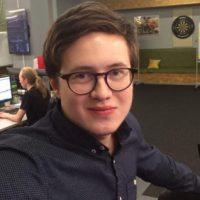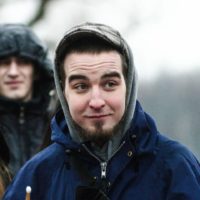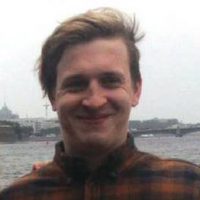If you have found a spelling error, please, notify us by selecting that text and pressing Ctrl+Enter.
Petersburg Network Trial Defendants Viktor Filinkov and Yuli Boyarshinov. Photo by Alexander Koryakov. Courtesy of Kommersant
Prosecution Tries to Pin “Code” on Network Defendants
Anna Pushkarskaya
Kommersant
May 21, 2019
The Volga District Military Court rejected the defense’s motion to send the Penza segment of the so-called Network case back to prosecutors. The prosecution has alleged the defendants established the Network (an organization now officially banned in the Russian Federation), a “terrorist community” of anarchists, in order to overthrow the regime.
Today in Penza the prosecution will begin presenting its case against the seven defendants.
This stage of the trial has been completed in Petersburg, where Viktor Filinkov and Yuli Boyarshinov are on trial for their alleged involvement in the community. Their defense attorneys have moved to disallow key pieces of evidence in the prosecution’s case and summon Penza FSB investigator Valery Tokarev and Petersburg FSB field officer Konstantin Bondarev to the stand. The two FSB officers have been accused by the defendants of torturing them with electrical shocks. The Moscow District Military Court, which is hearing the case in Petersburg, postponed its consideration of these motions until June 4.
The trial in Penza began later than the trial in Petersburg. During the second hearing in Penza, on May 15, after the indictment was read aloud, the defense moved to send the case back to the prosecutor’s office for further investigation. It argued the case had been carelessly patched together, and some of the evidence had been obtained under pain of torture. It was nearly impossible to mount a coherent defense against such an “absurd, vague, and inconsistent” indictment, they said.
Prosecutor Sergei Semerenko argued the trial should proceed, although he refused to rule out the possibility the indictment would ultimately be withdrawn and resubmitted on less serious charges.
The judges reacted to this turn of event unexpectedly. They withdrew to chambers and never returned to the courtroom. A court clerk eventually told the lawyers, waiting for a ruling on their motion, the hearing was adjourned, after which armed guards led the defendants away.
The next day it transpired the trial would resume on May 21.
In the Penza trial, Dmitry Pchelintsev and Ilya Shakursky have been charged with running the Network terrorist community. They face twenty years in prison if convicted. Arman Sagynbayev, Vasily Kuksov, Andrei Chernov, Mikhail Kulkov, and Maxim Ivankin have been charged with involvement in the alleged community. They face ten years in prison if convicted.
A number of the defendants have also been indicted on other charges, including weapons possession and drug trafficking.
In Petersburg, Viktor Filinkov and Yuli Boyarshinov also face charges of involvement in the alleged community. Boyarshinov has also been charged with possession of gunpowder.
Filinkov has claimed he was tortured and denies his guilt. Boyarshinov has complained of torture-like conditions in remand prison but has confessed his guilt.
The subject of torture also came during when a witness in the trial, Igor Shishkin, was questioned. Mr. Shishkin has already been convicted on charges of involvement with the alleged Network as part of a plea agreement with investigators. Members of the Petersburg Public Monitoring Commission found the most serious injuries on his body after he was initially detained and questioned by the FSB in January 2018.
When Mr. Shishkin was asked whether unacceptably violent methods had been used on him and whether had testified voluntarily, he smiled and replied, “The military investigator carried out a brilliant investigation: nothing of the sort was found.”
The Moscow Military District Court finished its examination of the evidence in Petersburg on May 17 after holding a video conference with witnesses in Penza, including the defendants on trial there. All the witnesses testified they had not seen Viktor Filinkov at training sessions in the woods.
However, Mr. Pchelinitsev and Mr. Sagynbayev testified they had not been questioned about the Petersburg case. The transcript of this interrogation had been copied from testimony they gave to FSB investigator Valery Tokarev in Penza while they were tortured. They later withdrew their testimony.
Mr. Filinkov, who worked as a programmer before his arrest, also claimed investigators had falsely interpreted physical evidence seized during searches and reached the wrong conclusions during their investigation.
In particular, he claimed he had not “zigzagged” around Petersburg on the day before his arrest before discarding the hard drives FSB field agents later found in a trash bin. The images and photos on the drives, which had been entered into evidence, were of the kind one would find in the possession of any punk. They had been produced by his wife Alexandra Askyonova as a teenager.
Ms. Aksyonova was granted political asylum in Finland last week.
Mr. Filinkov made a point of noting that Petersburg field officer Konstantin Bondarev, who had compiled the case file on him, should be charged with torture.
Ultimately, the court agreed to summon Mr. Tokarev and Mr. Bondarev to the witness stand, but so far they have failed to appear at the hearings.
The key evidence of the alleged anarchist community’s terrorist inclinations are two documents, seized from two of the Penza defendants: the so-called Code, which outlines the Network’s alleged goals and organizational structure, and the minutes of an interregional “congress” held in a Petersburg flat in 2017, featuring responses from the movement’s alleged cells to socio-political issues.
The FSB has claimed the cells were armed units. The minutes contain neither the names nor the pseudonyms of the respondents.
When Vladimir Putin discussed the Network case with the Presidential Human Rights Council, he referred to a report drafted for him; the report claimed that “founding and programmatic documents had been seized from the terrorist community.”
However, the defendants and witnesses have denied the existence of the documents, claiming they only held discussions during their meetings but did not ratify or sign documents.
Mr. Shishkin, who made a plea agreement with investigators, corroborated this.
Prosecutor Ekaterina Kachurina asked him, “Why did you become interested in anarchist ideology?”
“And why did you become a prosecutor?” he replied, explaining anarchism was interesting to him.
Mr. Pchelintsev said there had been no “congress,” only “a seminar by consensus.”
Vitaly Cherkasov, Mr. Filinikov’s defense attorney, said in court there was every reason to believe “an unlimited number of Petersburg and Penza FSB officials had illegal access over a lengthy period of time” to the hard drive and laptop on which the files containing the “Code” and the “Minutes” had, allegedly, been discovered, due to improprieties in the secure storage and unsealing of the physical evidence.
Mr. Boyarshinov’s assistant defense attorney, Olga Krivonos, moved to have the court declare the documents inadmissible as evidence, along with the FSB’s linguistic forensic investigation, which concluded the “Code” was a “set of instructions outlining the basic organizational principles of a network of combat units capable of resisting the current powers that be.”
The court has adjourned until June 4.
Translated by the Russian Reader. You can read more about the Network case and stories related to the case here.


